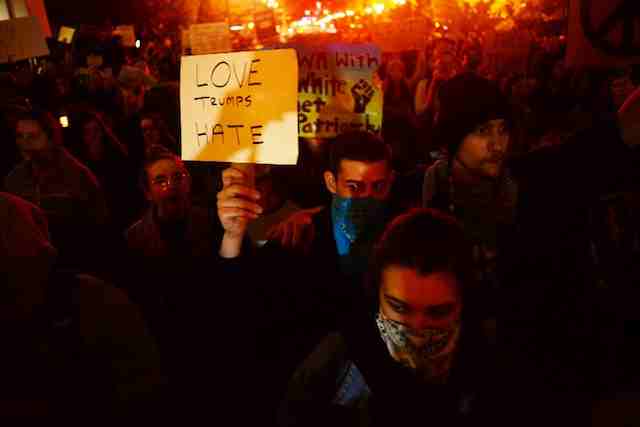Image may be NSFW.
Clik here to view.
I find myself at the front of the crowd when the march begins. My shoulders heavy with a backpack full of books and papers, I step forward, gingerly at first, until the crowd begins to chant in an unrelenting wave, "Whose streets? Our streets."
It is 7 pm on a Tuesday and I have come here straight from work. But tonight, as the American election season finishes off with a landslide win for Donald Trump, the day has developed its own weight, far greater than any I could ever carry alone.
My footsteps, gaining conviction, are among the first to arrive at the steps of the State House in Boston, Massachusetts. "When human rights are under attack, what do we do? Stand up, fight back!"
Little did I know that just one week later, Filipinos too would spill out into the streets in protest: this time, for the return of a dictator long dead, yet still able to cause so much pain. (READ: Marcos buried at Libingan ng mga Bayani)
For someone who was born and raised in the Philippines, it took me a long time to develop an interest in my country's history. In fact, it was only after living in the US for 4 years that I learned of Manila's status as the second most devastated Allied city after World War II; that of the events which took place in those 6 years, perhaps none was so damning as the Battle of Manila in 1945. It was during this time that the Americans, perceiving that Filipinos would experience untold suffering if left to the hands of rogue, bloodthirsty Japanese troops, decided that they should instead lay the city to waste with their own heavy artillery.
Today, I wonder how many Filipinos were let in on this decision. Today, I remember this city of my birth, and wonder what it could have looked like had it not been destroyed.
What I have learned from history is that often, Filipinos have been asked to accept the very tragedies which have defined us. Resilience is a word we have used to shape our narrative in times of war, times of slavery; resilience, one could say, is what has kept our people alive.
Image may be NSFW.
Clik here to view.
A history of acceptance
This is as true today as it was in the past, when the Philippines was not yet our Philippines. Each year, as typhoons and floods hollow us of homes and loved ones, relentless in their greed, we have been asked again and again to simply make peace with the things we cannot change. Our gift is that our past has prepared us to do just this. Our curse, however, is that while there are many who use this strength to rise up from times of struggle, there are just as many who would use it as a way to keep us in our place.
Take the Battle of Manila. Though this is just one example of Filipinos being forced to accept the will of a "higher power," it is surely one of the worst. That said, as a once-colonized people, our history is full of such moments. In history class, Filipinos are taught to be thankful to our Western colonizers; for giving us their religion, their language, their intervention in times of need. And yet what is often overlooked is the sacrifice of Filipinos themselves. Who can blame us? The idea that we have no say, that our sacrifices are a "necessary evil"... these have been forced upon us since the day Magellan's ships set anchor along the shores of Cebu.
These were habits borne of desperate times. Yet today, as a Filipino living in Trump's America, watching my countrymen protest the burial of a dictator at the Libingan ng mga Bayani, I find I am unable to accept the things which others tell me I cannot change.
Clik here to view.

When acceptance becomes dangerous
When news first broke about Trump's win, thousands of people in the city of Boston flocked to the Massachusetts State House in protest. In person and online, there were fellow Filipinos who told me that our protests would not change the results of the elections, that all we could do was "accept" this new establishment which had been built on a foundation of hatred and hostility.
But what they did not understand was that this protest had not been made to mourn what had already happened. No, what these protests stood for, what we stood for, was a collective message to the new establishment: that racism, sexism, and bigotry would not go unchecked. That moving forward, we, the people, would fight to ensure our rights were being respected and protected.
Existential philosopher Simone de Beauvoir once said that often, marginalized people are reluctant to renounce their alliance with a "superior caste" for fear of giving up "all the advantages conferred upon them by [that] alliance." I find that in the case of many Filipinos who voted in this election this has been proven, unfortunately, all too true.
Filipinos were the largest group of Asian Americans to vote for Trump. But we are also the largest group of undocumented Asian immigrants, and the Philippines is just one of the countries labeled a "terrorist threat" by Trump himself. What many of us do not realize – and I say "us" because I am still, in body and blood and upbringing, very much a Filipino – is that by accepting such a man as world leader, we are also validating all the claims he has made about our people, and condoning the suffering our fellow Filipinos are apt to face in the next 4 years.
Now, news is steadily being broken of the violence and harassment faced by women, the LGBT+ community, and people of color all over the United States, at the hands of those emboldened by Trump's victory. This, my dear Filipinos, is when the all-encompassing culture of acceptance becomes dangerous. To accept such things is to put ultimate trust in the government and its function as the hand of the people. But what happens when that function has been compromised?
Image may be NSFW.
Clik here to view.
Similarly, what Marcos' burial has proven to the Filipino people is something many have known all along, but have not yet been willing to accept: that the government, at times, will act contrary to the will of the people. Our country's collective amnesia is simply one more symptom of that contradiction.
When it was announced that Ferdinand Marcos' son would be running for vice president, it was often the millennial generation who was blamed for not understanding the atrocities of Martial Law. But what this rhetoric does is simply shift the responsibility to those who are easiest to blame: the generation that was not there to experience it. And while it is true that we may not have seen or heard these things firsthand, we have seen the pictures online and in our history books. We have heard the stories of our parents and grandparents, some of whom may have been victims themselves of that merciless regime, and taken their lessons to heart. (READ: #NeverAgain: Martial Law stories young people need to hear)
What's more, the protests which have erupted in universities and high schools, spilling out of social media and into the streets of Manila, are hard proof that our generation has indeed learned from history. I hear these young people's frustrations, their demands and angry cries, and I see Filipinos who are beginning to realize that we no longer need to accept the things that hurt us. Now, instead of placing the blame on the poor, the young, or other marginalized peoples, we are the ones who are willing and able to enact change. Now, as American activist Angela Davis wrote, we are working to change the things we cannot accept.
According to my father, as hundreds of thousands of people came together for the People Power Revolution in 1986, military tanks and troops began to surround the protesters on all sides. He said that these men had been ordered to shoot, but by some miracle, had chosen instead to retreat and leave the protesters be.
And the rest, as they say, is history. The events that followed saw the birth of a new Philippines: free of a dictator, but most importantly, free by their own hand. Today, Filipinos await that same freedom. But to achieve it, we must fight for it ourselves. – Rappler.com
Are you an OFW with a story to tell? Send contributions to balikbayan@rappler.com.
Clik here to view.
Clik here to view.
Clik here to view.
Clik here to view.
Clik here to view.
Clik here to view.